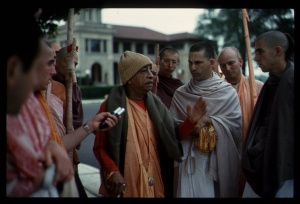CC Madhya 8.39 (1975): Difference between revisions
(Vanibot #0027: CCMirror - Mirror CC's 1996 edition to form a basis for 1975) |
(Vanibot #0020: VersionCompareLinker - added a link to the Version Compare feature) |
||
| Line 2: | Line 2: | ||
<div style="float:left">'''[[Sri Caitanya-caritamrta (1975)|Śrī Caitanya-caritāmṛta (1975)]] - [[CC Madhya (1975)|Madhya-līlā]] - [[CC Madhya 8 (1975)|Chapter 8: Talks Between Śrī Caitanya Mahāprabhu and Rāmānanda Rāya]]'''</div> | <div style="float:left">'''[[Sri Caitanya-caritamrta (1975)|Śrī Caitanya-caritāmṛta (1975)]] - [[CC Madhya (1975)|Madhya-līlā]] - [[CC Madhya 8 (1975)|Chapter 8: Talks Between Śrī Caitanya Mahāprabhu and Rāmānanda Rāya]]'''</div> | ||
<div style="float:right">[[File:Go-previous.png|link=CC Madhya 8.38 (1975)|Madhya-līlā 8.38]] '''[[CC Madhya 8.38 (1975)|Madhya-līlā 8.38]] - [[CC Madhya 8.40 (1975)|Madhya-līlā 8.40]]''' [[File:Go-next.png|link=CC Madhya 8.40 (1975)|Madhya-līlā 8.40]]</div> | <div style="float:right">[[File:Go-previous.png|link=CC Madhya 8.38 (1975)|Madhya-līlā 8.38]] '''[[CC Madhya 8.38 (1975)|Madhya-līlā 8.38]] - [[CC Madhya 8.40 (1975)|Madhya-līlā 8.40]]''' [[File:Go-next.png|link=CC Madhya 8.40 (1975)|Madhya-līlā 8.40]]</div> | ||
{{CompareVersions|CC|Madhya 8.39|CC 1975|CC 1996}} | |||
{{RandomImage}} | {{RandomImage}} | ||
==== TEXT 39 ==== | ==== TEXT 39 ==== | ||
| Line 25: | Line 24: | ||
<div class="translation"> | <div class="translation"> | ||
"It is the general practice of all saintly people to deliver the fallen. Therefore they go to people's houses, although they have no personal business there. | |||
</div> | </div> | ||
| Line 32: | Line 31: | ||
<div class="purport"> | <div class="purport"> | ||
A sannyāsī is supposed to beg from door to door. He does not beg simply because he is hungry. His real purpose is to enlighten the occupant of every house by preaching Kṛṣṇa consciousness. A sannyāsī does not abandon his superior position and become a beggar just for the sake of begging. Similarly, a person in householder life may be very important, but he may also voluntarily take to the mendicant way of life. Rūpa Gosvāmī and Sanātana Gosvāmī were ministers, but they voluntarily accepted the | A sannyāsī is supposed to beg from door to door. He does not beg simply because he is hungry. His real purpose is to enlighten the occupant of every house by preaching Kṛṣṇa consciousness. A sannyāsī does not abandon his superior position and become a beggar just for the sake of begging. Similarly, a person in householder life may be very important, but he may also voluntarily take to the mendicant way of life. Rūpa Gosvāmī and Sanātana Gosvāmī were ministers, but they voluntarily accepted the mendicant's life in order to humbly preach Śrī Caitanya Mahāprabhu's message. It is said about them: tyaktvā tūrṇam aśeṣa-maṇḍala-pati-śreṇīṁ sadā tuccha-vat bhūtvā dīna-gaṇeśakau karuṇayā kaupīna-kanthāśritau. Although the Gosvāmīs were very aristocratic, they became mendicants just to deliver the fallen souls according to the order of Śrī Caitanya Mahāprabhu. One should also consider that those who engage in the missionary activities of Kṛṣṇa consciousness are under the guidance of Śrī Caitanya Mahāprabhu. They are not actually beggars; their real business is to deliver fallen souls. Therefore they may go from door to door just to introduce a book about Kṛṣṇa consciousness so that people can become enlightened by reading. Formerly brahmacārīs and sannyāsīs used to beg from door to door. At the present moment, especially in the Western countries, a person may be handed over to the police if he begs from door to door. In Western countries, begging is considered criminal. Members of the Kṛṣṇa consciousness movement have no business begging. Instead, they work very hard to introduce some books about Kṛṣṇa consciousness so that people can read them and be benefited. But if one gives some contribution to a Kṛṣṇa conscious man, he never refuses it. | ||
</div> | </div> | ||
Latest revision as of 20:18, 27 January 2020

A.C. Bhaktivedanta Swami Prabhupada
TEXT 39
- mahānta-svabhāva ei tārite pāmara
- nija kārya nāhi tabu yāna tāra ghara
SYNONYMS
mahānta-svabhāva—the nature of saintly persons; ei—this; tārite—to deliver; pāmara—fallen souls; nija—own; kārya—business; nāhi—there is not; tabu—still; yāna—goes; tāra—his; ghara—house.
TRANSLATION
"It is the general practice of all saintly people to deliver the fallen. Therefore they go to people's houses, although they have no personal business there.
PURPORT
A sannyāsī is supposed to beg from door to door. He does not beg simply because he is hungry. His real purpose is to enlighten the occupant of every house by preaching Kṛṣṇa consciousness. A sannyāsī does not abandon his superior position and become a beggar just for the sake of begging. Similarly, a person in householder life may be very important, but he may also voluntarily take to the mendicant way of life. Rūpa Gosvāmī and Sanātana Gosvāmī were ministers, but they voluntarily accepted the mendicant's life in order to humbly preach Śrī Caitanya Mahāprabhu's message. It is said about them: tyaktvā tūrṇam aśeṣa-maṇḍala-pati-śreṇīṁ sadā tuccha-vat bhūtvā dīna-gaṇeśakau karuṇayā kaupīna-kanthāśritau. Although the Gosvāmīs were very aristocratic, they became mendicants just to deliver the fallen souls according to the order of Śrī Caitanya Mahāprabhu. One should also consider that those who engage in the missionary activities of Kṛṣṇa consciousness are under the guidance of Śrī Caitanya Mahāprabhu. They are not actually beggars; their real business is to deliver fallen souls. Therefore they may go from door to door just to introduce a book about Kṛṣṇa consciousness so that people can become enlightened by reading. Formerly brahmacārīs and sannyāsīs used to beg from door to door. At the present moment, especially in the Western countries, a person may be handed over to the police if he begs from door to door. In Western countries, begging is considered criminal. Members of the Kṛṣṇa consciousness movement have no business begging. Instead, they work very hard to introduce some books about Kṛṣṇa consciousness so that people can read them and be benefited. But if one gives some contribution to a Kṛṣṇa conscious man, he never refuses it.